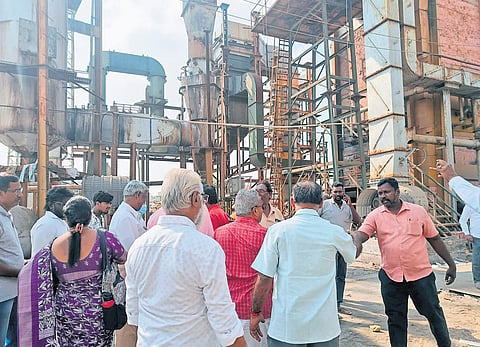

CHENNAI: The Tamil Nadu Pollution Control Board (TNPCB) is likely to shut down the waste incinerator unit in Manali and issued strict directives citing multiple environmental and regulatory violations.
The facility will be able to re-commission the operation only after revamping the existing air pollution control measures and providing suitable heat/energy recovery system, said S Vasuki, district environmental engineer (Ambattur), TNPCB, in a communication addressed to the member secretary of the board.
The 10-tonne-per-day incinerator, operated by Triad Intratech for the Greater Chennai Corporation (GCC), has been running without a valid consent to operate since March 31, 2020. An inspection was conducted on Wednesday during which several serious lapses, including deteriorated pollution control systems, improper waste disposal, and non-compliance with environmental regulations were found.
Officials found the incinerator’s air pollution control measures were in a dilapidated condition. The venturi and wet scrubbers, which are crucial for filtering toxic emissions, were not functioning effectively. The plant, which incinerates non-biodegradable municipal solid waste such as plastic, napkins, diapers, and footwear, was found operating without a heat or energy recovery system, violating the Solid Waste Management Rules, 2016.
As a result, the TNPCB mandated that the unit cannot resume operations until it revamps its air pollution control measures and installs a suitable heat or energy recovery system.
Another major concern was the handling of incinerated ash. Although the facility had claimed to process the ash into paver blocks, the inspection found no such infrastructure in place. Instead, about 500 kg of incinerated ash was found stored in plastic sacks and left on open ground.
The ash was reportedly being transported to the Kodungaiyur dump yard, sources told TNIE. TNPCB has collected samples of the ash for laboratory analysis to assess its toxicity. The board has also directed the unit to ensure proper ash disposal methods in compliance with environmental norms.
As the plant has been operating without a valid consent to operate, the TNPCB has instructed the unit to immediately apply for and obtain a renewal before recommencing its operations. The board had previously issued multiple show-cause notices, but the unit failed to take corrective action.
Residents have repeatedly raised complaints about air pollution, black soot deposits, and health problems such as respiratory ailments caused by the incinerator. A fact-finding report by civil society organisations, which contained soil samples collected near the plant showed cadmium levels 16 times higher than permissible limits, along with high concentrations of lead and chromium.